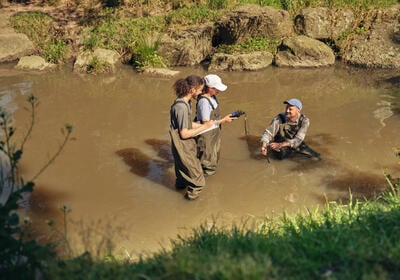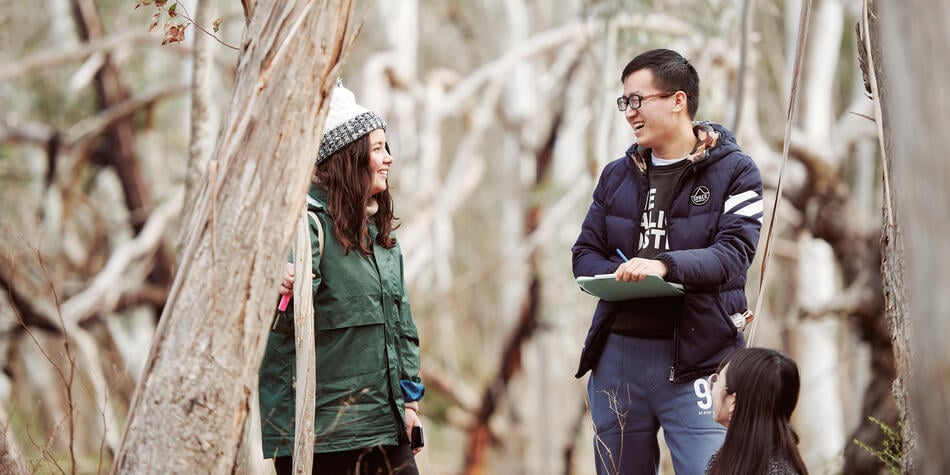Learn where the action unfolds
All of Deakin’s environment and sustainability courses have a focus on practical experience and offer hands-on learning from year one, ensuring you graduate skilled and work-ready. Depending on your course, you may learn skills like:
- measuring the health of freshwater environments
- coastal planning
- surveying wildlife populations
- conducting sustainability assessments
- studying seals and penguins.
Wildlife and conservation biology, and environmental management fieldtrips
From year one, until their final year, students of wildlife and conservation biology or environmental management have the opportunity to go on three amazing fieldwork experiences:
Cape Conran Coastal Park
In your first year you’ll visit 12,000-hectare Cape Conran Coastal Park for four days. You’ll learn about parks management issues and wildlife conservation, including how to handle small mammals, identify their sex and micro-chip. You’ll also use radio-tracking, camera trapping and perform bird surveys.
The Grampians
In year two you'll visit the Grampians, known for its striking series of sandstone mountain ranges. You’ll carry out experiments that you’ve designed, learn how to analyse research data and discover how to work well in a team.
Great Otway National Park
Your final year fieldtrip will be a six-day visit to Great Otway National Park. You'll design and implement a large-scale wildlife survey in some of the best rainforest scenery in southern Australia. You’ll perform spotlight surveys, small mammal trapping, owl and koala surveys.
I found the hands-on, off-campus trips to be the most rewarding and memorable part of my course. Getting the opportunity to be out with professionals handling animals and learning new skills has been fantastic!
Michael Spurr
Bachelor of Environmental Science (Wildlife and Conservation Biology) student
Marine biology fieldtrips
In your first, second and third years, you’ll visit coastal rocky shores, mangroves and salt marshes, estuaries, the surf beach and open shallow sea. Jump aboard Deakin's research and teaching boats to measure the physical and chemical characteristics of the marine environment, and to identify the rich diversity of animals and plants living in coastal sea habitats. You'll also have the opportunity to visit our Marine Science Centre in Queenscliff– a key centre for marine research in southern Australia.
Learn more about the Deakin Queenscliff Marine Science Centre
The most rewarding parts of my course were field activities. Whether it was a short trip to the beach to learn about seaweed or coastal processes, or a full day field trip to the mountain ranges to learn about freshwater systems, there were plenty of opportunities for hands-on learning.
Lughaidh Kennedy
Bachelor of Environmental Science student
Environmental management and sustainability fieldtrips
Our environmental management and sustainability students visit parks, rivers, water management facilities and more.
Community environment parks and sustainability centres – learn about sustainable communities, community gardening and green technologies.
Urban parks – learn how to conduct vegetation surveys, analyse water quality, map soils and microclimate and analyse groundwater pollution.
Cultural heritage tours – go on a cultural heritage tour with traditional owners of the land in western Victoria.
Waste management businesses – analyse, develop strategies and improvement programs for waste management, and develop environmental policies and project plans.
Australian coast – explore coastal development and develop skills in land use planning and environmental impact assessment.
National parks – learn about scientific research, data analysis and teamwork.
Central Highlands – examine the effects of fire on plant and animal communities.
Victoria's rivers – measure river health and observe management actions.
Urban water management facilities – explore management options for storm water and wastewater.

Our fieldwork in action
Study environmental management and sustainability at Deakin and get out into your chosen field to develop solutions to the environmental issues we face on a national and international scale.
Zoology and animal science fieldtrips
Day-long or multi-day overnight fieldtrips take place in you second and third years. You’ll visit varied Victorian environments, from coastal forests through to desert ecosystems. On some fieldtrips you’ll work with local conservation organisations and assist in conservation management.
You’ll learn important skills, including research design, survey techniques, animal observation, trapping and handling, measuring environmental variables, habitat assessment and the use of various equipment and instruments.
Contact us
Get in touch if you have any further questions regarding the School of Life and Environmental Sciences.
+61 3 9244 6699

